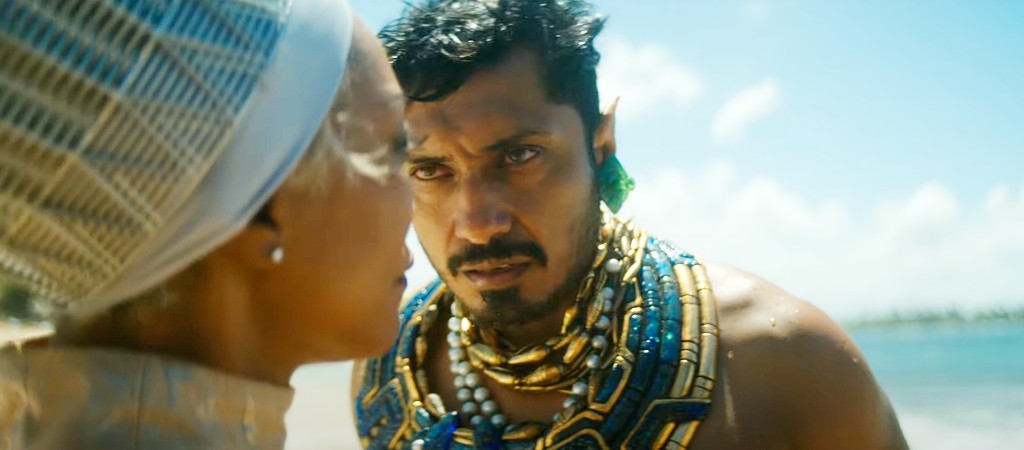The first reviews for Black Panther: Wakanda Forever are roaring in, and the consensus is clear: Writer/director Ryan Coogler pulled off an impressive feat by not only delivering a sequel without the presence of Chadwick Boseman, but by making one with an epic scale that lives up to the impressive standard set by the first film.
According to the critics, Wakanda Forever makes Boseman’s loss (both in the real world and the Marvel Cinematic Universe) feel palpable, as the kingdom of Wakanda is faced with its greatest foe yet: Tenoch Huerta’s Namor. The leader of the underwater realm of Taloka is on a collision course with the seemingly unprotected African nation, and his verbal and physical clashes with Letitia Wright’s Shuri are frequently highlighted in the first round of reviews.
You can read what the critics are saying about Wakanda Forever below:
Pete Hammond, Deadline:
The whole idea of carrying the story forward without its key driving on screen force of King T’Challa would be a tall order for anyone. Fortunately for us it is one that has been largely met with dignity, grief over unthinkable loss, and a determination to do the right thing by director Ryan Coogler.
Owen Gleiberman, Variety:
Teaming up again with co-screenwriter Joe Robert Cole, the filmmaker has woven the demise of his leading man into the very firmament of his story. As the characters, led by Letitia Wright’s Shuri, the princess of Wakanda who is T’Challa’s younger sister, proceed to mourn T’Challa’s death, they tap deeply into our collective feelings about Boseman. That sounds like a standard thing for a movie in this predicament to do, except that where Coogler goes further is in building his entire drama — the drive, power and passion of it — around the wounding hole in Wakanda left by T’Challa’s death.
Toussaint Egan, Polygon:
Wakanda Forever somehow feels even more intimately woven into the tapestry of its own moment, which is both extraordinary and fitting. With T’Challa’s death (and Boseman’s) at its crux, Wakanda Forever is an altogether darker, more complicated film than its predecessor. Coogler’s script, co-credited to Joe Robert Cole, focuses on the ways grief can morph into something awful and hateful under duress, and if left unresolved for too long. In their respective mourning, Shuri and Namor are foils, accentuating by example the self-destructive ways in which denying grief only serves to prolong it.
David Rooney, The Hollywood Reporter:
Even if the length feels overextended, Coogler and his editors deserve credit for allowing breathing space between the action scenes for character and relationship development, with Ludwig Göransson’s African-inflected score enhancing both those quieter moments and the big smackdowns. It’s impossible for Wakanda Forever to match the breakthrough impact of its predecessor, but in terms of continuing the saga while paving the way for future installments, it’s amply satisfying.
Todd Gilchrist, The A.V. Club:
Wakanda Forever doubles down beautifully on the first film’s celebration and showcase of marginalized cultures, first by expanding its depiction of the late T’Challa’s eponymous country, and then by adding Namor’s native Talokan in all of its magic and beauty. The new film delivers on action that’s as intense — if perhaps not quite as cleanly executed — as before, and offers a humanistic spotlight for the motivations, and stakes, of everyone involved.
Charles Pulliam-Moore, The Verge:
Huerta brings a raw magnetism to his performance as a Namor who’s always just as ready to charm as he is to murder while sizing up other monarchs he deems worthy of his recognition and presence. In particular, scenes between Namor and Shuri stand out not for their visually dazzling qualities but because of the crackling intensity of the current running between them — two conflicted figureheads of state trying to be strategic about how they interact.
David Ehrlich, IndieWire:
Coogler’s subthread of the MCU continues to operate at a significantly higher strata of thought, artistry, and feeling than the rest of Marvel’s assembly line. Every major character in Wakanda is left to determine whether T’Challa’s memory will be a blessing or a torment, and the movie around them is so wracked by the same tension that even its most formulaic moments are heavy with a human weight that blockbusters seldom have the strength to carry.
Mike Ryan, Uproxx:
This is why I keep calling Black Panther: Wakanda Forever a miracle. Honestly, after all everyone went through, it’s a miracle if they made a movie that’s even remotely watchable. Let alone good. Let alone great. It feels like a Doctor Strange type situation of going through each and every scenario until the found the one that wouldn’t end in failure. Well, they did it. They found the one true path.
Black Panther: Wakanda Forever hits theaters on November 11.







